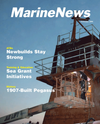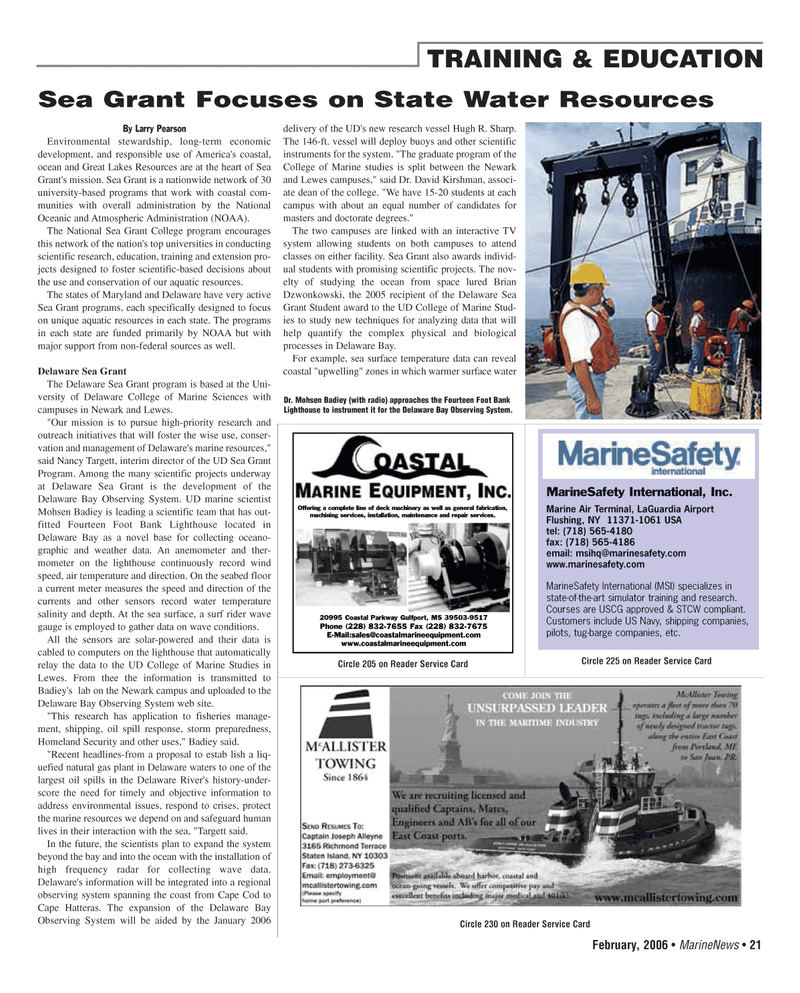
Page 21: of Marine News Magazine (February 2006)
The Training & Education Edition
Read this page in Pdf, Flash or Html5 edition of February 2006 Marine News Magazine
By Larry Pearson
Environmental stewardship, long-term economic development, and responsible use of America's coastal, ocean and Great Lakes Resources are at the heart of Sea
Grant's mission. Sea Grant is a nationwide network of 30 university-based programs that work with coastal com- munities with overall administration by the National
Oceanic and Atmospheric Administration (NOAA).
The National Sea Grant College program encourages this network of the nation's top universities in conducting scientific research, education, training and extension pro- jects designed to foster scientific-based decisions about the use and conservation of our aquatic resources.
The states of Maryland and Delaware have very active
Sea Grant programs, each specifically designed to focus on unique aquatic resources in each state. The programs in each state are funded primarily by NOAA but with major support from non-federal sources as well.
Delaware Sea Grant
The Delaware Sea Grant program is based at the Uni- versity of Delaware College of Marine Sciences with campuses in Newark and Lewes. "Our mission is to pursue high-priority research and outreach initiatives that will foster the wise use, conser- vation and management of Delaware's marine resources," said Nancy Targett, interim director of the UD Sea Grant
Program. Among the many scientific projects underway at Delaware Sea Grant is the development of the
Delaware Bay Observing System. UD marine scientist
Mohsen Badiey is leading a scientific team that has out- fitted Fourteen Foot Bank Lighthouse located in
Delaware Bay as a novel base for collecting oceano- graphic and weather data. An anemometer and ther- mometer on the lighthouse continuously record wind speed, air temperature and direction. On the seabed floor a current meter measures the speed and direction of the currents and other sensors record water temperature salinity and depth. At the sea surface, a surf rider wave gauge is employed to gather data on wave conditions.
All the sensors are solar-powered and their data is cabled to computers on the lighthouse that automatically relay the data to the UD College of Marine Studies in
Lewes. From thee the information is transmitted to
Badiey's lab on the Newark campus and uploaded to the
Delaware Bay Observing System web site. "This research has application to fisheries manage- ment, shipping, oil spill response, storm preparedness,
Homeland Security and other uses," Badiey said. "Recent headlines-from a proposal to estab lish a liq- uefied natural gas plant in Delaware waters to one of the largest oil spills in the Delaware River's history-under- score the need for timely and objective information to address environmental issues, respond to crises, protect the marine resources we depend on and safeguard human lives in their interaction with the sea, "Targett said.
In the future, the scientists plan to expand the system beyond the bay and into the ocean with the installation of high frequency radar for collecting wave data.
Delaware's information will be integrated into a regional observing system spanning the coast from Cape Cod to
Cape Hatteras. The expansion of the Delaware Bay
Observing System will be aided by the January 2006 delivery of the UD's new research vessel Hugh R. Sharp.
The 146-ft. vessel will deploy buoys and other scientific instruments for the system. "The graduate program of the
College of Marine studies is split between the Newark and Lewes campuses," said Dr. David Kirshman, associ- ate dean of the college. "We have 15-20 students at each campus with about an equal number of candidates for masters and doctorate degrees."
The two campuses are linked with an interactive TV system allowing students on both campuses to attend classes on either facility. Sea Grant also awards individ- ual students with promising scientific projects. The nov- elty of studying the ocean from space lured Brian
Dzwonkowski, the 2005 recipient of the Delaware Sea
Grant Student award to the UD College of Marine Stud- ies to study new techniques for analyzing data that will help quantify the complex physical and biological processes in Delaware Bay.
For example, sea surface temperature data can reveal coastal "upwelling" zones in which warmer surface water
February, 2006 • MarineNews 21
TRAINING & EDUCATION
MarineSafety International, Inc.
Marine Air Terminal, LaGuardia Airport
Flushing, NY 11371-1061 USA tel: (718) 565-4180 fax: (718) 565-4186 email: [email protected] www.marinesafety.com
MarineSafety International (MSI) specializes in state-of-the-art simulator training and research.
Courses are USCG approved & STCW compliant.
Customers include US Navy, shipping companies, pilots, tug-barge companies, etc.
Circle 230 on Reader Service Card
Circle 225 on Reader Service Card
Offering a complete line of deck machinery as well as general fabrication, machining services, installation, maintenance and repair services.
Phone (228) 832-7655 Fax (228) 832-7675
E-Mail:[email protected] www.coastalmarineequipment.com 20995 Coastal Parkway Gulfport, MS 39503-9517
Circle 205 on Reader Service Card
Sea Grant Focuses on State Water Resources
Dr. Mohsen Badiey (with radio) approaches the Fourteen Foot Bank
Lighthouse to instrument it for the Delaware Bay Observing System.
FEBRUARY MN2006 3(17-24).qxd 2/3/2006 5:16 PM Page 21

 20
20

 22
22
